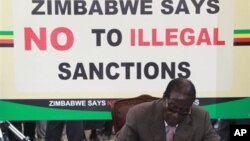The Barack Obama administration on Wednesday extended targeted sanctions imposed on President Robert Mugabe and his Zanu PF colleagues saying there are no tangible political reforms in the country.
President Obama said the renewal of the sanctions is designed to protect American interests and promote democracy in Zimbabwe, which has been ruled by Mr. Mugabe since the nation attained independence from British rule in 1980.
What do Zimbabweans think about the extension of the sanctions? For perspective, Studio 7 reached Zanu PF-leaning political commentator Gadzira Chirumanzu and Obert Gutu, spokesperson of the Movement for Democratic Change led by former Prime Minister Morgan Tsvangirai.
Chirumanzu said the renewal of the sanctions is part of the West’s regime change agenda.
“What we need to understand is that as per Obama these sanctions he is coining them by saying that Zimbabwe is a threat to the U.S. But we wonder what kind of threat is Zimbabwe posing to the United States of America. So, for any reasonable Zimbabwean who knows what is going on in the political arena this is just a big fuss and the western governments’ mentality to make sure they stop any African to think of, you know, possessing his wealth in the form of resources.”
Chirumanzu said the West wants to overexploit Africa’s national resources after “almost exhausting its own”, a move he believes has forced Mr. Mugabe to face western governments head-on in terms of social, economic and political issues.
But Gutu shot back saying President Mugabe’s government has over the years committed serious atrocities against Zimbabweans.
In the 1980s, more than 20,000 people were allegedly massacred by the North Korean-trained Five Brigade in the Matabeleland and Midlands province. Most of the people who were killed were supporters of the then Zapu leader Joshua Nkomo, who in 1987 signed a political truce with Mr. Mugabe in an attempt to stop the atrocities.
“It is on record that President Robert Mugabe has always had an extremely low appetite for human rights observance. It is almost one year since the journalist-cum-human rights activist Itai Dzamara was abducted by suspected state security agents in Glen View (Harare) … But we are surprised as the MDC that almost a year down the line the Zanu PF regime seems unfazed, seems unbothered about this sad event, the disappearance of Itai Dzamara. Infact, they are pouring scorn repeatedly on his disappearance, actually, instead of sympathizing with his family.
“They are adding salt to injury … to an injured wound … It shows that with respect we are dealing with a regime here that is callous, a regime that is intolerant … The MDC is not in government … We do not dictate to the USA on how they do their foreign policy, how they formulate it but we are saying yes we do agree with the U.S assessment to the effect that the political situation in Zimbabwe is far from being stable, that there continues to be some human rights violations and that the Zanu PF regime remains a rogue regime.”
Chirumanzu hit back saying Gutu appeared to be singing for his super as his party had close links with the West.
Former U.S. president Bush declared a national emergency on Zimbabwe, under Executive Order 13288 of 2003, accusing Zimbabwean leaders of undermining democratic practices.
President Obama has been extending the targeted sanctions annually since he took over power from Mr. Bush.






